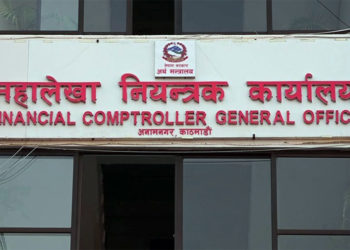KATHMANDU: Economic Digest offers a concise yet comprehensive overview of significant business happenings in Nepal, presented in easily digestible summaries.
Nepal’s Foreign Trade Declines by Rs 36.69 Billion
Nepal’s foreign trade dropped by Rs 36.69 billion in the first 10 months of the fiscal year, totaling Rs 1.429 trillion. Both imports and exports declined, with imports falling to Rs 1.303 trillion and exports to Rs 126.17 billion. The trade deficit stood at Rs 1.177 trillion, with imports dominating at 91.17%.
Despite a brief surge during the festive season, monthly imports declined subsequently. This decline in trade volume has hindered government revenue collection, achieving only 60% of the target. Additionally, Nepal imported over 110,000 two-wheelers, including 5,888 electric scooters, in the same period.
The data paints a concerning picture for Nepal’s economy. The significant decline in foreign trade, with both imports and exports dropping, suggests challenges in both domestic production and international competitiveness. The trade deficit remains high, indicating a heavy reliance on imports, particularly for essential goods. This dependency could strain the country’s foreign exchange reserves and overall economic stability.
Nepal Ratifies BIMSTEC Charter
Nepal has officially ratified the BIMSTEC Charter, marking a significant step after three decades of its inception. The Charter came into effect on Monday following approval by Nepal’s House of Representatives on April 2. BIMSTEC Secretary General Indramani Pandey confirmed the fulfillment of all necessary conditions for implementation.
The ratification after three decades marks a significant milestone, enabling the regional bloc’s expansion and inviting external partners to join. With its entry into force, BIMSTEC, now representing seven member states and a substantial portion of the global population and economy, stands poised for enhanced collaboration and integration in the Asia-Pacific region.
The Charter’s entry into force enables external partners, observers, and new members to join the regional bloc. Nepal’s approval process, in line with its internal procedures, was completed with the submission of the Charter to the federal parliament as mandated by Article 279(1) of the Constitution and Section 4 of Nepal’s Treaty Act, 2027.
Gold Prices Dip in Domestic Market
The gold market on Tuesday highlighted a notable decline in the domestic market, indicated by a significant drop in both fine gold and standard gold prices per tola. This decline, marked by a decrease of Rs 1,200 and Rs 1,200 per tola respectively, suggests a shift in market dynamics impacting precious metal values.
Furthermore, the concurrent decrease in silver prices, by Rs 55 per tola, reinforces the overall trend of decreasing prices in the precious metals market, potentially influenced by factors such as market demand, global economic conditions, and fluctuations in currency exchange rates.
Declining Spring Paddy Farming in Lumbini Province Spurs Shift to Maize Cultivation
In Lumbini province, the decline of spring paddy farming is attributed to inadequate irrigation, prompting farmers to switch to maize cultivation, which offers higher yields and earnings with superior hybrid seeds.
Despite government promises to expand spring paddy acreage, challenges persist, leading to a nationwide decline in cultivation. While productivity of spring paddy remains high, limited irrigation and labor shortages hinder its growth.
The decline in spring paddy farming in Lumbini province, due to irrigation challenges, has led farmers to switch to maize cultivation for better yields and earnings. Despite government pledges to expand paddy acreage, ongoing obstacles, including labor shortages and urban demand preferences, contribute to a nationwide decline in cultivation, posing a grim outlook for agriculture in western Nepal.
Birgunj Metropolis Revenue Falls Short Amid Economic Downturn
Birgunj Metropolis collected nearly Rs 400 million in revenue over the last 10 months, up by Rs 31.8 million compared to the same period last fiscal year. Despite aiming for Rs 700 million, only Rs 398 million was collected due to an economic downturn affecting trade activities. Land tax collection also fell short, reaching only Rs 139 million against a target of Rs 500 million. Chief Administrative Officer Matrika Bhattarai attributed the shortfall to a decline in the real estate sector. Revenue diversification includes Rs 49 million from house rent.
Forex: US dollar steady, others dip
The US dollar on Tuesday remained stable, while the Euro, Pound, and Australian dollar show a decreasing trend compared to previous days, indicating potential fluctuations in currency exchange markets.
Nepal Rastra Bank has maintained the US dollar’s rate at 133.04 (buying) and 133.64 (selling). Meanwhile, the Euro, Pound, and Australian dollar decreased.
(Compiled and prepared by Srija Khanal)
Economic Digest is a daily morning economic digest, basically relatable summations of the most important business news, and happenings from Nepal into easy-to-understand summaries.









Comment